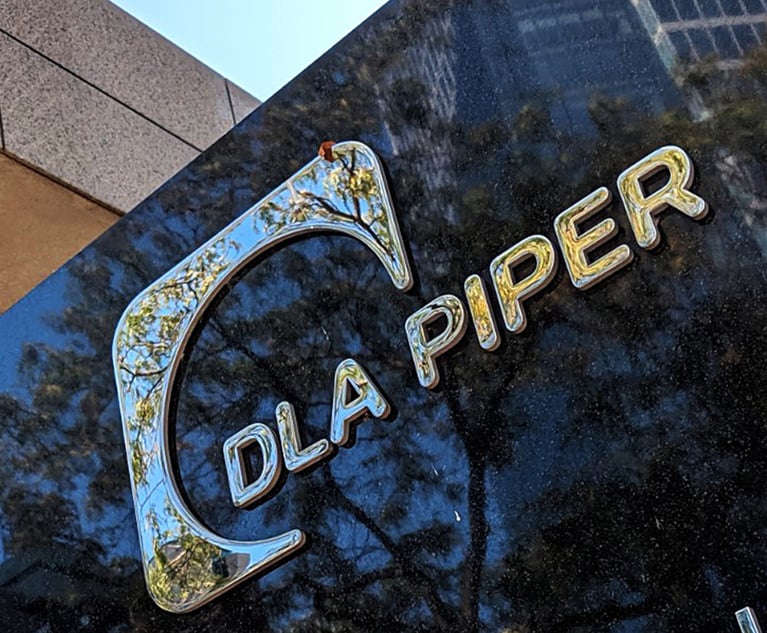 Dallas skyline reflected in Trinity River at sunset. (PHoto: Shutterstock.com)
Dallas skyline reflected in Trinity River at sunset. (PHoto: Shutterstock.com)Growth Opportunities in Dallas Lure Wick Phillips, Despite Incursion of Out-of-State Firms
Texas firm Wick Phillips competes against other midsize firms, but increasingly also vying with national and international firms for clients and in lateral market.
March 13, 2020 at 10:37 AM
4 minute read
The original version of this story was published on Law.com
Firm Name: Wick Phillips
Firm Leader: David Drez, managing partner
Head Count: 89
Locations: Dallas, Fort Worth, Austin
Practice Areas: Full service
Governance structure and compensation model: Managing partner chairs committee of five attorneys that includes a partner in charge of firm finances; compensation depends on position.
Do you offer alternative fee arrangements? Yes
What do you view as the two biggest opportunities for your firm, and what are the two biggest threats?
The national and international firms coming into the Dallas market present us with a huge opportunity to continue to differentiate Wick Phillips. We are, and always have been, neighbors of and partners with our Texas clients, and are focused on the communities where we live and work. We have high-caliber talent that is not hamstrung by the rate pressure that comes with multiple offices in markets across the country. Our firm is growing, so another big opportunity is to add talent in the areas we specialize in while also exploring some areas that we may have been referring clients elsewhere.
The legal market is so competitive now—what trends do you see, and has anything, including alternative service providers, altered your approach? Is your chief competition other mid-market firms, or is your firm competing against big firms for the same work?
As discussed above, the most pervasive trend we see is national and international firms clamoring to get into the Dallas market. That trend has not altered our approach aside from taking advantage of the opportunities it presents. As for our chief competition, we certainly compete against other midsize firms, but we seem to be competing against big firms more frequently, particularly in terms of talent, as well as for clients.
There is much debate around how law firms can foster the next generation of legal talent. What advantages and disadvantages do midsize firms have in attracting and retaining young lawyers, particularly millennials?
We have been focusing as a firm on strategies to accommodate the needs of a changing workforce. It has been an interesting study and a little challenging to dispel some of the misconceptions people have about the millennial generation. As a midsize firm, we have the advantage of flexibility to really engage young lawyers to find out what they want and need, and to partner with them to try new things and think outside the box, along with our ability to be more nimble in making decisions and instituting any changes.
Does your firm employ any nonlawyer professionals in high-level positions (e.g. COO, business development officer, chief strategy officer, etc.)? If so, why is it advantageous to have a nonlawyer in that role? If not, have you considered hiring any?
We do not get too consumed with a precise title and have a nonlawyer professional, Jolee Fay, who wears several hats, and all of them well. One thing we've learned in the last 3–to–5 years is the value of promoting from within, particularly with respect to our nonlawyer personnel. There are a number of nonlawyer personnel who, like Jolee, have evolved into greater roles in the firm in areas of accounting, human resources, as well as legal assistants. When a position needs to be filled, the first place we look is at our existing talent.
What would you say is the most innovative thing your firm has done recently, whether it be technology advancements, internal operations, how you work with clients, etc.?
We are constantly trying new things. Our hiring from within strategy, mentioned above, is one thing. Last year we had a business development consultant provide a three-month training program that was well-received. We are transitioning into bigger space in Dallas later this year and plan to incorporate a number of innovative concepts into our new space.
Does your firm have a succession plan in place? If so, what challenges do you face in trying to execute that plan? If you don't currently have a plan, is it an issue your firm is thinking about?
As a first-generation firm, this is something we constantly think about. The youth of firm leadership gives us some flexibility in determining how succession planning will take place within the firm. We are putting pieces of a plan in place each year and making it a collaborative process that allows all constituencies to have a voice.
This content has been archived. It is available through our partners, LexisNexis® and Bloomberg Law.
To view this content, please continue to their sites.
Not a Lexis Subscriber?
Subscribe Now
Not a Bloomberg Law Subscriber?
Subscribe Now
NOT FOR REPRINT
© 2024 ALM Global, LLC, All Rights Reserved. Request academic re-use from www.copyright.com. All other uses, submit a request to [email protected]. For more information visit Asset & Logo Licensing.
You Might Like
View All
From ‘Deep Sadness’ to Little Concern, Gaetz’s Nomination Draws Sharp Reaction From Lawyers
7 minute read
DLA Piper Sued by 2 Houston Companies, Alleging a 'Fake Lawyer' Represented Them in Argentina
3 minute read

Trending Stories
- 1When Police Destroy Property, Is It a 'Taking'? Maybe So, Say Sotomayor, Gorsuch
- 2New York Top Court Says Clickwrap Assent Binds Plaintiff's Personal-Injury Claim to Arbitration in Uber Case
- 3'You Can’t Do a First Draft of Common Sense': Microsoft GC Jon Palmer Talks AI, Litigation, and Leadership
- 4About the Awards: Southeastern Legal Awards Q&A with Regional Managing Editor Michael Marciano
- 5Private Credit Boom: Miami’s Role as a Financial and Litigation Hub
Who Got The Work
Michael G. Bongiorno, Andrew Scott Dulberg and Elizabeth E. Driscoll from Wilmer Cutler Pickering Hale and Dorr have stepped in to represent Symbotic Inc., an A.I.-enabled technology platform that focuses on increasing supply chain efficiency, and other defendants in a pending shareholder derivative lawsuit. The case, filed Oct. 2 in Massachusetts District Court by the Brown Law Firm on behalf of Stephen Austen, accuses certain officers and directors of misleading investors in regard to Symbotic's potential for margin growth by failing to disclose that the company was not equipped to timely deploy its systems or manage expenses through project delays. The case, assigned to U.S. District Judge Nathaniel M. Gorton, is 1:24-cv-12522, Austen v. Cohen et al.
Who Got The Work
Edmund Polubinski and Marie Killmond of Davis Polk & Wardwell have entered appearances for data platform software development company MongoDB and other defendants in a pending shareholder derivative lawsuit. The action, filed Oct. 7 in New York Southern District Court by the Brown Law Firm, accuses the company's directors and/or officers of falsely expressing confidence in the company’s restructuring of its sales incentive plan and downplaying the severity of decreases in its upfront commitments. The case is 1:24-cv-07594, Roy v. Ittycheria et al.
Who Got The Work
Amy O. Bruchs and Kurt F. Ellison of Michael Best & Friedrich have entered appearances for Epic Systems Corp. in a pending employment discrimination lawsuit. The suit was filed Sept. 7 in Wisconsin Western District Court by Levine Eisberner LLC and Siri & Glimstad on behalf of a project manager who claims that he was wrongfully terminated after applying for a religious exemption to the defendant's COVID-19 vaccine mandate. The case, assigned to U.S. Magistrate Judge Anita Marie Boor, is 3:24-cv-00630, Secker, Nathan v. Epic Systems Corporation.
Who Got The Work
David X. Sullivan, Thomas J. Finn and Gregory A. Hall from McCarter & English have entered appearances for Sunrun Installation Services in a pending civil rights lawsuit. The complaint was filed Sept. 4 in Connecticut District Court by attorney Robert M. Berke on behalf of former employee George Edward Steins, who was arrested and charged with employing an unregistered home improvement salesperson. The complaint alleges that had Sunrun informed the Connecticut Department of Consumer Protection that the plaintiff's employment had ended in 2017 and that he no longer held Sunrun's home improvement contractor license, he would not have been hit with charges, which were dismissed in May 2024. The case, assigned to U.S. District Judge Jeffrey A. Meyer, is 3:24-cv-01423, Steins v. Sunrun, Inc. et al.
Who Got The Work
Greenberg Traurig shareholder Joshua L. Raskin has entered an appearance for boohoo.com UK Ltd. in a pending patent infringement lawsuit. The suit, filed Sept. 3 in Texas Eastern District Court by Rozier Hardt McDonough on behalf of Alto Dynamics, asserts five patents related to an online shopping platform. The case, assigned to U.S. District Judge Rodney Gilstrap, is 2:24-cv-00719, Alto Dynamics, LLC v. boohoo.com UK Limited.
Featured Firms
Law Offices of Gary Martin Hays & Associates, P.C.
(470) 294-1674
Law Offices of Mark E. Salomone
(857) 444-6468
Smith & Hassler
(713) 739-1250






